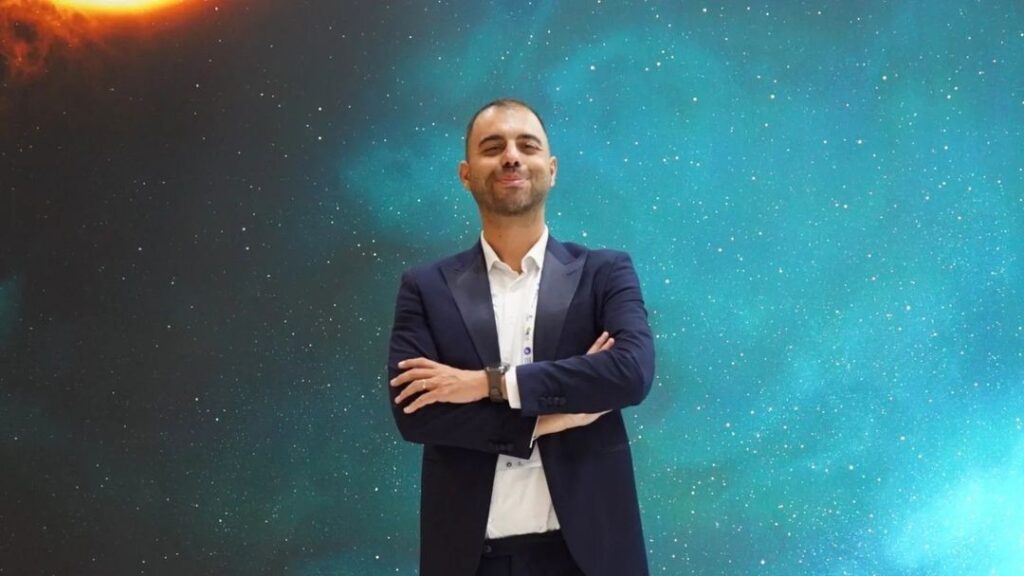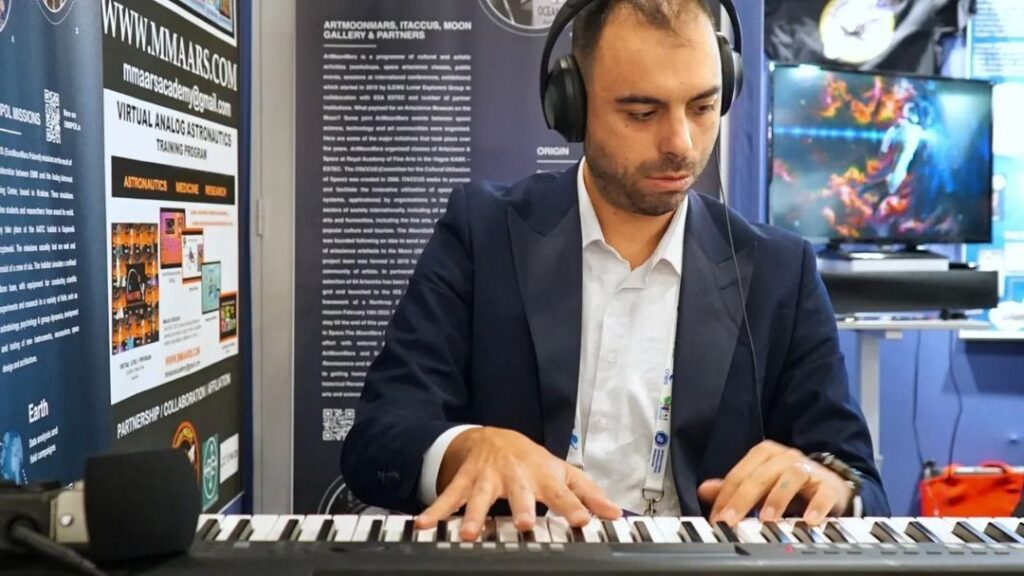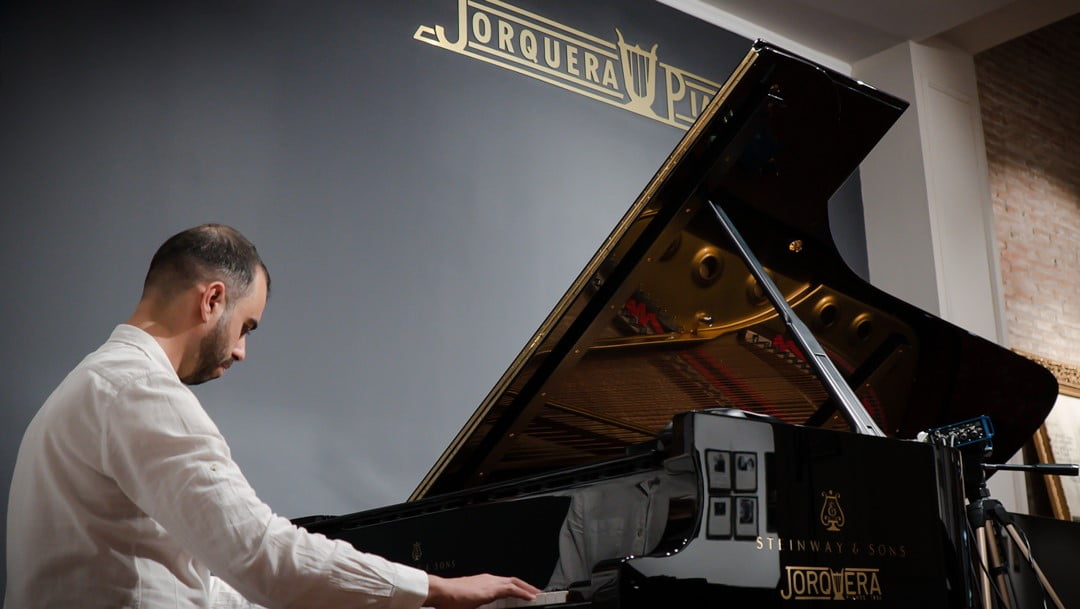After spending a month on the International Space Station following a successful launch from Cape Canaveral on July 14, 2022, aboard a SpaceX CRS25 rocket, the space music composition “Maleth” by pianist and aerospace engineer Leonardo Barilaro is now accessible online. It was transmitted to Earth on August 15th, as the ISS passed over Malta. Check out the song and the exclusive interview with Leonardo Barilaro below:

1. Can you tell us a bit about where you come from and how it all got started?
LEONARDO BARILARO: Hello Everybody! I am Italian and I grew up very close to Venice. I discovered the piano at the age of 6 and astronomy at 9. At the age of 12, by reading Isaac Asimov, playing Beethoven and Bach, listening to Queen, Steve Vai and Robert Miles, I decided I would travel the Space and play my music outside planet Earth. So, I became a professional pianist AND an aerospace engineer. For sure growing up in Italy supported a lot the development of my cultural background.
I started in 2006 my own main music project, Nullo die sine nota, Not a day without a note.
2. Did you have any formal training or are you self-taught?
LEONARDO BARILARO: My journey hit important milestones to reach my Dream. As a pianist I graduated from the Music Conservatory in Italy, studying composition and developing my passion for synths and electronic music. I was mentored by Jordan Rudess, Dream Theater’s keyboardist. In the meanwhile, I graduated with a PhD in Aerospace Engineering at the University of Padova, researching on hypervelocity impacts and space safety.
3. Who were your first and strongest musical influences and why the name ‘LEONARDO THE SPACE PIANIST’?
LEONARDO BARILARO: For sure J.S. Bach and Beethoven were my first and strongest musical influences, since when I was a kid. Later on my inspiration corner became so big that it is difficult to recap it in few words. I chose ‘Leonardo the Space Pianist’ for several reasons. As starting point, I am very lucky to share the same name of Leonardo Da Vinci. The true excellence of the Renaissance man and unmatched polymath. He has been always a great inspiration for me. Space Pianist because I am literally moving my steps along the path of being able to play the piano in Space and because…I am an aerospace engineer of course. The first milestone of this journey was reached last summer, where my music composition Maleth was onboard the International Space Station and streamed to Earth.
4. What do you feel are the key elements in your music that should resonate with listeners, and how would you personally describe your sound?
LEONARDO BARILARO: My music has very often melancholic nuances, and dives into deep introspection with harsh oxymoron in contrasts.
I would describe my sound as dreamy, often dark, distant and “reverberated”.

LEONARDO BARILARO:
In my opinion true originality, being able to be a game changer is only for very few pioneers in Art.
Musicians can evolve, can go a step further, but being able to go back to the ‘origins’, hence the word ‘originality’, to really change the path it is something very rare to find. An example in music is Stravinsky, another name in art that comes to my mind is Guadì.
On my journey, to arrive where I am now I passed through different periods, such as a neoclassical phase, an experimental period (influenced by Ligeti and other avant-gardes) and a ‘lanx satura’ period, influenced by progressive metal and electronic music too.
To use Hegel’s words, it is a constant process of ‘aufhebung’, where I keep and discard element along the way with a continuous synthesis.
6. What’s your view on the role and function of music as political, cultural, spiritual, and/or social vehicles – and do you try and affront any of these themes in your work, or are you purely interested in music as an expression of technical artistry, personal narrative and entertainment?
LEONARDO BARILARO:
Everything is connected, it would be naïve to think otherwise. It would also be naïve to consider the music itself as carrier of a message, it is a language, a very complicate language at a deeper level of awareness. As every language the reaction is related to the listener.
The experience of the pandemic due to Covid-19 can give a glimpse of what will be travelling in Space for long periods of time.
Humans will need Art and so, Music to keep going and avoid feeling completely isolated.
7. Do you feel that your music is giving you back just as much fulfilment as the amount of work you are putting into it, or are you expecting something more, or different in the future?
LEONARDO BARILARO:
All Arts, if developed with intellectual honesty are a marathon, not just a sprint. And the amount of work outside and inside the artist is huge.
Of course I am expecting more and there isn’t an arrival point, I am curious to see what will be different in the future, since everything constantly changes. I still feel at the beginning of my revolution, which basically is an orbit following the laws of nature.
8. Could you describe your creative processes? How do usually start, and go about shaping ideas into a completed song? Do you usually start with a tune, a beat, or a narrative in your head? And do you collaborate with others in this process?
LEONARDO BARILARO:
It really depends on the target I set on myself. The path every time is different, but there are some main routes I follow most that can be classified as follows:
-Improvisation: It is a composition methodology with a very, very small time interval for processing the material.
-Inspiration and development through composition: Like for the improvisation, I find this modality really intriguing and it is a sort of meditation.
-Experimentation and iterative process development of techniques: In this case what fascinates me more is the intellectual challenge of trying something very different and apparently, in some cases, non-sense. To see where the result will lead.
-Analytical approach: For me it is the deepest form of devotion to the art. It is something an artist must deal with himself.
I did many collaborations in the past with different types of artists, so not only musicians but also dancers and visual artists.
Currently nearly all my focus is on going “solo”.
9. What has been the most difficult thing you’ve had to endure in your life or music career so far?
LEONARDO BARILARO: Regarding my music journey I can recall in particular 2 moments:
– For 4 years I was living without a real acoustic piano, just a digital one (with also some damaged keys).
It can appear a minor thing, but for a pianist it makes a huge difference. The good side of that is that I learnt many new things in parallel since I put my focus on improving on electronic music for example and I learnt how to optimise resources when studying or preparing for a concert. At that time I was also teaching in a music school, where I became friend with the director. A super kind soul that was always allowing me to practice on the baby grand at the school when there were no lessons.
– In 2016 I moved to Malta and with this I changed completely life. For several months I had the equivalent of the “writer block”, that was upsetting me even more since I was expecting the opposite, due to the change of environment and different sources of inspiration. But no, I wasn’t creating new music.
I learnt to accept and overcome it. Now in 2022 the situation is completely different, I am developing my project “Space Piano Music Everyday”, where every single day I release a new piece of space piano music on all the main music distribution platforms with related video on YouTube, plus I work on projects like the EP “Genesis” and the composition “Maleth”.
10. On the contrary, what would you consider a successful, proud or significant point in your life or music career so far?
LEONARDO BARILARO: For now my proudest moment was seeing my piano composition “Maleth” reaching the Space. The music was stored on the computer of the Maltese mission sharing the same name and led by Prof Joseph Borg of the University of Malta and it was launched onboard the SpaceX CRS25 rocket. It reached the International Space station last 14th July and it was broadcasted to Earth on the 15th of August, when the ISS was flying over Malta.
Thank you for this interview, See You Up There!
KEEP IN TOUCH:
FACEBOOK | INSTAGRAM | SPOTIFY | WEBSITE | YOUTUBE

Photo credits: Dean Bartolo
